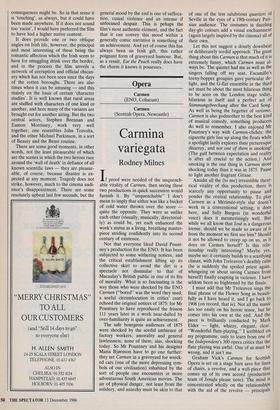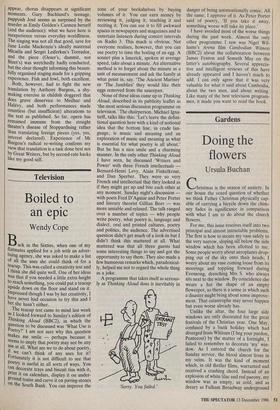Opera
Carmen (ENO, Coliseum) Carmen (Scottish Opera, Newcastle)
Carmina variegata
Rodney Milnes
If proof were needed of the unquench- able vitality of Carmen, then seeing these two productions in quick succession would furnish it. By "unquenchable" I don't mean to imply that either was like a bucket of cold water thrown over the score quite the opposite. They were as unlike each other (visually, musically, directorial- ly) as could be, yet each enhanced the work's status as a living, breathing master- piece striding confidently into its second century of existence.
Not that everyone liked David Pount- ney's production for the ENO. It has been subjected to some withering notices, and the critical establishment lifting up its collective skirt to avoid the dirt is a spectacle not dissimilar to that of Macaulay's British public in one of its fits of morality. What is so fascinating is the way those who were shocked by the ENO Carmen ("bored" was the word they used, a useful circumlocution in critics' cant) echoed the original notices of 1875: for Mr Pountney to have reproduced the frisson 111 years later in a work near-dulled by over-familiarity is quite an achievement.
The safe bourgeois audiences of 1875 were shocked by the sordid ambience of factory workers, amorality and general lawlessness, none of them, alas, shocking today. So Mr Pountney and his designer Maria Bjornson have to go one further: they set Carmen in a graveyard for wreck- ed cars (one of the more depressing sym- bols of our civilisation) inhabited by the sort of people one encounters in more adventurous South American movies. The air of physical danger, not least from the solidery, and anarchy must be akin to that of one of the less salubrious quartiers of Seville in the eyes of a 19th-century Pari- sian audience. The costumes in dazzling day-glo colours add a visual enchantment (again largely inspired by the cinema) all of their own.
Let this not suggest a dourly downbeat or deliberately sordid approach. The great thing about this Carmen is that much of it is extremely funny, which Carmen must al- ways be. The quintet had me as well as the singers falling off my seat, Escamillo's teeny-bopper groupies gave particular de- light, and the G-flat ensemble in the third act must be about the most hilarious thing to be seen on the London stage today, hilarious in itself and a perfect act of Stimmungsbrechung after the Card Song. As well as being the begetter of verismo, Carmen is also godmother to the best kind of musical comedy, something producers do well to remember. I also enjoyed Mr Pountney's way with Carmen-clichés: the cigarette girls line up along the floats while a spotlight lazily explores their picturesque disarray, and not one of them is smoking! (The gulf between expectation and reality is after all crucial to the action.) And smoking is the one thing in Carmen more shocking today than it was in 1875. Pause to light another fragrant Gitane.
Amidst all the (to me) irresistible theat- rical vitality of this production, there is scarcely any opportunity to pause and ponder the central relationship. To play Carmen as a Merimee-style slut doesn't work in a conventional setting; it does here, and Sally Burgess (in wonderful voice) does it mesmerisingly well. But while we all know that Jose is a dangerous loonie, should we be made so aware of it from the moment we first see him? Should it not be allowed to creep up on us, as it does on Carmen herself? Is this rela- tionship really interesting? Maybe yes, maybe no: it certainly builds to a scarifying climax, with John Treleaven's deathly calm (he is suddenly the spoiled priest again, whingeing on about saving Carmen from herself) finally erupting in violence. I have seldom been so frightened by the finale.
I must add that Mr Treleaven sings the final phrase of the Flower Song as beauti- fully as I have heard it, and I go back to 1908 (on record, that is). Not all the music lies too easily on his heroic tenor, but he comes into his own at the end. And the piece is brilliantly conducted by Mark Elder — light, whizzy, elegant, clear. "Wonderful flute-playing," I scribbled on my programme, only to learn from one of the Independent's 300 opera critics that the flute playing was awful. One of us must be wrong, and it ain't me. Graham Vick's Carmen for Scottish Opera is set on a stage bare save for lines of chairs, a revolve, and a wall-piece that comes up of its own accord (production team of Jenufa please note). The mind 15 concentrated wholly on the relationships with the aid of the revolve — principals appear, chorus disappears at significant moments. Gary Bachlund's teenage, puppyish Jose seems as surprised by the murder as Emily Golden's Carmen herself (and the audience): what we have here is inexperience versus everyday worldliness. The singing was not all that good, save for Jane Leslie Mackenzie's ideally maternal Micaela and Sergei Leiferkus's Toreador, and the piece (Oeser's, dammit, not Bizet's) was wretchedly badly conducted, but the clear thought informing this beauti- fully organised staging made for a gripping experience. Fish and fowl, both excellent.
Both, however, had to fight the new translation by Anthony Burgess, a shy- making exercise in childish doggerel that does grave disservice to Meilhac and Halevy, and both performances made countless (but insufficient) alterations to the text as published. So far, opera has remained immune from the straight theatre's disease of Stoppardising rather than translating foreign pieces (yes, yes, interest declared). Experience of Mr Burgess's radical re-writing confirms my view that translation is a task done best not by Great Writers, but by second-rate hacks like my good self.



































































 Previous page
Previous page